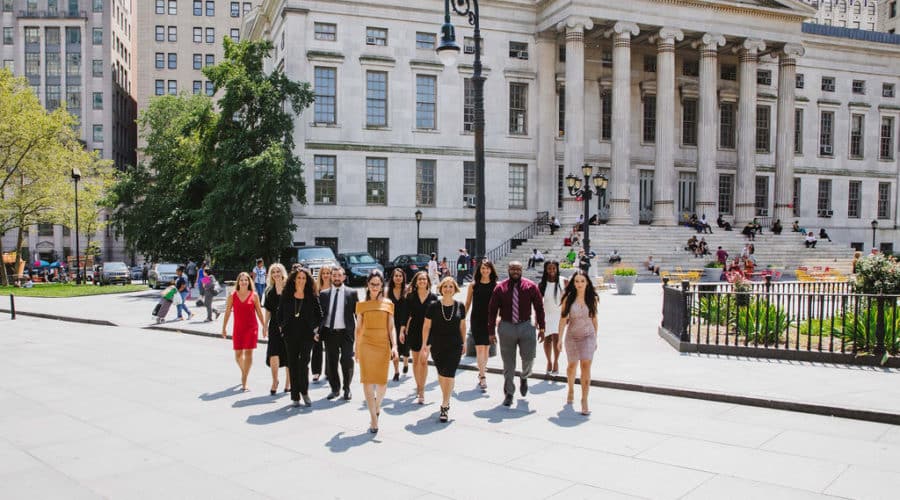(Updated August 7, 2019) Matthew Herrick v Grindr LLC
Our client, Matthew Herrick, was stalked and harassed by his ex-boyfriend through the Grindr app. The ex-boyfriend had created impersonating profiles to arrange sex dates with over a thousand men who came to Matthew’s home and workplace. Matthew reported it to Grindr over 100 times. He also got an Order of Protection and made criminal complaints against his ex, but the strangers kept coming. The impersonating profiles told them that Matthew had drugs to share and wanted to role-play rape fantasies. When our firm served Grindr’s team with a court order demanding they exclude Matthew’s ex from using their product, they said they didn’t have the technology to do so. They own the patent to geo-locating technology! And yet, they can’t screen users?!
We said, “If you can’t control your product, it’s dangerous.” So we, along with co-counsel Tor Ekeland Law, PLLC, sued Grindr using theories of products liability. This case challenges Section 230 of the Communications Decency Act (CDA), which tech companies claim exempts them from being liable for harm that happens on their platforms. The CDA, passed in 1995, was initially created to protect online bulletin boards from defamation cases. Over the last twenty-two years, the law has become broader and broader because of the way courts have interpreted it, granting protections to a broader array of internet service providers for a broader array of harmful activities.
However, the 2nd Circuit has only ruled on this case twice in its entire 22 years of existence and indicated in the 2016 FTC v LeadClick that it wants to rein it back in. We lost in a motion to dismiss in the Eastern District of New York. We appealed to the 2nd Circuit and received amicus briefs in support from organizations all over the country — those interested in domestic violence, LGBTQ issues, privacy, and consumer welfare. Oral arguments are this winter. Check back here for an update on the exact date.
At its heart, this case is about the intersection of computer and consumer law, privacy, and intimate partner violence. Grindr claims that it had no duty to help its users and claims this case is an affront to what the internet economy was built on — free speech and discourse. We call bullshit on that. The internet economy is based on advertising and data collection. Free apps and products just lure to get people online so companies can advertise at them and study their behavior and consumerism.
Tech is the only industry that gets this exceptionalist treatment and believes itself to be beyond the scope of the courts and regulators. Consequently, these companies have run amok with no fear of ever being sued by users. It’s why Facebook had no legal responsibility when the Russians hacked our elections. It’s why there were markets for child sex trafficking and revenge porn.
Why are we allowing the most powerful and omniscient companies — Facebook, Google, Twitter — to get away with never facing courts for the ills they cause? Lawsuits and the threat of being sued keeps companies in line. Can you imagine society without criminal laws? That’s basically the level of freedom they enjoy. At our expense.
UPDATE: The 2nd Circuit upheld the District Court’s dismissal of Herrick’s claims and then denied our motion for rehearing en banc. On August 7, 2019, we filed a petition for certiorari with the Supreme Court of the United States
Read the PDFs of the case files on the matter.
SCOTUS Petition for a Writ of Certiorari for Herrick, filed August 7, 2019
Second Circuit Decision issued March 27, 2019
2nd Circuit Reply Brief for Plaintiff-Appellant Herrick, filed September 6, 2018
2nd Circuit Opposition Brief for Defendants-Appellees Grindr LLC and KL Grindr Holdings, Inc, filed August 23, 2018
2nd Circuit Opposition Brief for Defendant-Appellee Grindr Holding Company, filed August 23, 2018
2nd Circuit Brief for Plaintiff-Appellant, filed May 24, 2018
1st Corrected Amended Complaint EDNY, filed March 31, 2017
Amici Curiae in Support of Plaintiff-Appellant Herrick
Our client’s case received robust amicus support from leading non-profit organizations and law groups that have a nuanced understanding of how technology and social media are tools used to facilitate sexual violence and harassment against targets.
In Support of Plaintiff-Appellant
Prepared by Sanctuary for Families, Cyber Sexual Abuse Task Force, Day One, Domestic Violence Legal Empowerment & Appeals Project, Her Justice, Legal Momentum, My Sister’s Place, New York Legal Assistance Group, and Safe Horizon
In Support of Appellant and Urging Reversal
Prepared by the Electronic Privacy Information Center
Urging Reversal of the Order Dismissing Without Leave to Amend
Prepared by Break the Cycle, National Association of Women Lawyers, National Network to End Domestic Violence, Laura’s House, Legal Aid Society of Orange County, and Public Law Center
In Support of Appellant Herrick and Urging Reversal
Prepared by Consumer Watchdog




